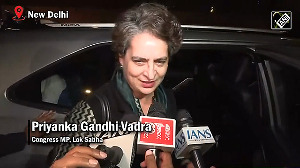The surge in export, domestic demand and public spending in infrastructure projects might revive private investment during 2017-18.

The government could not have hoped for a better end to financial year 2016-17. It has enough reason to begin 2017-18 (from April 1) with optimism.
Last Monday, the finance minister presented four Bills to parliament, to bring about the Goods and Services Tax (GST) regime by July 1. The Lok Sabha passed all by Wednesday; the Rajya Sabha’s suggestions on these would not matter, being money Bills.
The GST Council meeting on Friday is expected to finalise the Rules that will set the stage for extensive outreach programmes by the government to sensitise and educate the trade and its bureaucracy.
States are expected to pass the state GST laws in their legislatures very soon. The Council is expected to meet regularly, to finalise the commodity-wise tax rates and other details.
The government also got the Finance Bill, 2017, passed by Parliament on Thursday. With the President’s assent expected before the end of the financial year, the government will be able to start spending money on its various programmes, as proposed in the Budget, from the beginning of April itself. This can help boost demand, which took a hit with the currency demonetisation in early November.
Gross Domestic Product data from elsewhere point to revival in global demand; this might help export growth. In February, export grew in double digits; the figures for March might also reflect the usual rush to export before the year-end.
The surge in export, domestic demand and public spending in infrastructure projects might revive private investment during 2017-18.
Politically, the government seems best placed to take on any exigencies, with support from voters at large for various policies and programmes.
The massive win in the election to the Uttar Pradesh assembly has strengthened its political base. With governments in most states and the Centre by the same party, implementing its economic policies effectively might not be difficult.
Of course, there are uncertainties. The extraordinary heat in the month of March in several parts portend severe water shortages. The early monsoon forecasts are not encouraging.
The rupee has strengthened to less than 65 to a dollar. That might help control inflation but make import cheaper and hurt export, making the task of employment generation more difficult.
Protectionism in richer countries might dampen growth in global trade. However, all these uncertainties do not look so formidable when weighed against the positives.
The expectation of significant economic growth in 2017-18 are best reflected by the sentiment in the booming equity market.
Exporters are somewhat worried that in the new GST dispensation, schemes granting exemptions might be replaced with others that grant refunds.
This might mean the blocking of their working capital in taxes, something that will impose costs and hit their competitiveness. They need to engage actively with the commerce and finance ministries to get their views across.
Photograph: Vijay Mathur/Reuters






